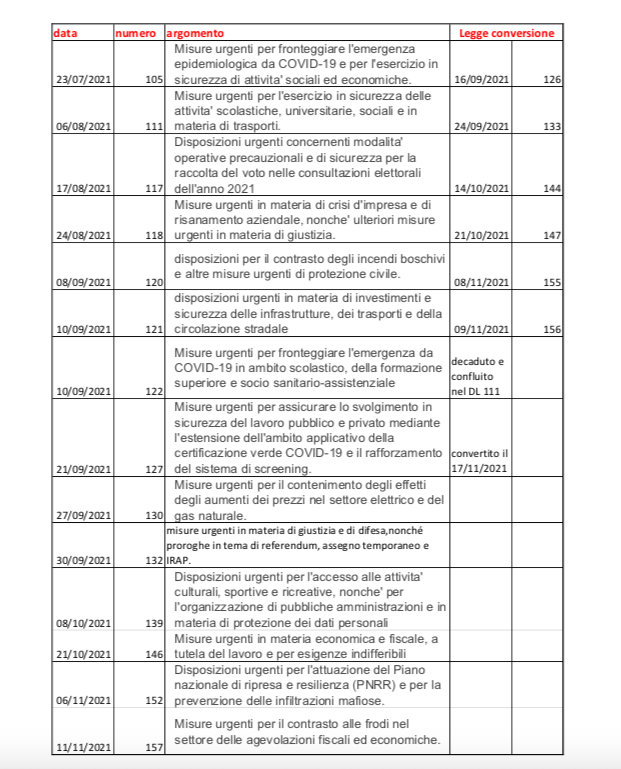I’ll tell you about the Parliament flooded with decrees

What happens in Parliament with the flood of the emergency decree. The in-depth study by Giuseppe Liturri
It has been about four months since 23 July. That day the President of the Republic, Sergio Mattarella, dipped his pen in caustic soda before writing a letter to the Presidents of the Chambers to invite them to "a more rational and disciplined recourse to the emergency decree".
Since then, a real regulatory deluge has been unleashed on the Chambers. On that same day, decree law 105 arrived, opening the long sequence of decrees relating to the regulation of the green pass. The last one arrived on Thursday 11th, thus reaching fourteen decree laws, of which seven converted, one lapsed and six awaiting conversion. Almost one a week, including August. Added to these are the delegated bills on tax reform, civil process reform (approved in the Senate and under discussion in the Chamber), disability reform and competition (still in transit between the Accounting Office and the Quirinale). In addition to the reform of the criminal process which has already been law since 27 September. All this in full examination session of the budget law 2022, presented to the Senate only on November 16, with a considerable delay compared to the expected deadline of October 20.
In the next 40 days, including Christmas and Boxing day, the Chambers will have to convert 6 decree laws, approve the 2022 budget law and four other bills to delegate the government on very important matters. Between a panettone and a sparkling wine, the parliamentarians will also have to find time to approve the ratification law of the Treaty on the reform of the Mes and will be delivered, as every year before the New Year's toast, the inevitable decree law "a thousand extensions".
But the problem, already enormous in itself, is not so much the number of measures as the way in which they are presented, discussed and approved. Which were precisely the subject of Mattarella's summer grievances, in which he asked to “change the current trend. The decree-laws must have an original object as defined and circumscribed by subject as possible […] the amendment activity must be limited by the subject or by the purpose originally object of the provision, as defined by the Government. The confluence of a decree-law in another emergency measure […] must occur only in exceptional cases and in a manner that does not prejudice parliamentary examination. […] Also to remove the usual practice, now generalized, which consists in the presentation of maxi amendments on which to raise the question of trust ". To close, Mattarella invited "Parliament and the Government to reconsider the procedures for exercising the emergency decree, with the aim of obviating the critical profiles […] that have now assumed dimensions and produced effects that are difficult to sustain" and promised that he would evaluate " any recourse to the option provided for by article 74 (referral to the Chambers of the conversion laws, ed.) of the Constitution against laws for the conversion of decree-laws characterized by serious anomalies that were submitted to me ".
Words that were dragged away like corks on the shoreline at the arrival of the regulatory tsunami between summer and autumn. The votes of confidence on maxi government amendments have been lost and the second reading has effectively disappeared.
For everyone, the fate of the delegated bill for the reform of the civil process is valid. Approved at first reading in the Senate, it is now being examined by the Chamber, where all the amendments have been rejected in the Justice Commission. For the simple reason that there would be no time to have the text thus amended return to the Senate for third reading. Is it possible that a reform destined to have such profound and lasting effects on the lives of citizens will be liquidated without a broad discussion and the contribution of the deputies?
The government's total disregard for the President's words is well documented in the acts of the Committee for legislation at the Chamber – body of ten deputies today chaired by Alessio Butti of FdI, which has the role of issuing an opinion on the specificity, homogeneity and limits content of all the decree laws – which in the opinions issued in recent weeks had to denounce the emptying of the parliamentary function.
In particular, in the last session of Wednesday 17 the Committee examined the Law Decree 152 on the implementation of the PNRR. An avalanche of 52 articles and 180 paragraphs all aimed at "putting the flag" on the 51 objectives to be achieved by 31 December to receive the first installment (after the August deposit) of the PNRR and the arrows towards Palazzo Chigi were exceptionally severe and numerous.

It starts from the lack of urgency requirements, missing when the adoption of an implementation decree by the Minister of Tourism is even foreseen "by 31 March 2025". The Committee is forced to admit that "these are measures for which the decision of the EU Council approving the Italian PNRR provides for the deadline for approval of December 2021" and therefore the purpose justifies the completely inappropriate means. But doubts also arise about their "effective suitability to achieve the objectives set by the decision of the EU Council" and the parliamentarians sink the blow by asking "a reflection on the advisability, with reference to the PNRR, of a legislative planning shared between Parliament and Government that avoids in future of approaching the deadlines set by the PNRR with a significant number of legislative measures still to be approved, which makes it inevitable, as in the case in question, the use of large-scale decree-laws, with possible prejudice to an adequate legislative investigation " . Well aware that this situation is likely to repeat itself for the next 9 semesters, the Committee asks that Parliament have at least time to read what it votes. The invitation to "avoid an expansion beyond its scope of the specific type of replacement powers envisaged for the implementation of the PNRR" should also be emphasized. Basically, the Committee let Palazzo Chigi know that it is not possible to vote under the threat “either do as we say, or we do it directly”.
The alarm is transversal between all the political groups present in the Committee and even the Hon. Stefano Ceccanti of the PD denounced "the alternating single chamber which seems to have established itself in fact".
In this regard we have collected the passionate j'accuse of the Hon. Maura Tomasi della Lega, former president of the Committee, who did not hesitate to speak of "expropriation of the legislative function of Parliament by the Government". In particular, "with the Draghi government the tendency to present decree laws at close range and assist – to prevent a discussion that would prolong the time and jeopardize conversion – to an abnormal expansion of the examination by the branch of Parliament that receives them at first reading, which always ends close to the 60-day deadline for conversion, thus leaving the other branch only a few days in which even the mere reading of the texts is physically impossible " . He added that "this way of proceeding in health matters could be tolerated obtitously, but finding oneself analyzing – in the same emergency conditions – the choices of the PNRR that will affect the future of our country for the next decade and beyond, is simply unconstitutional". What are the remedies then? “Stop” concludes Tomasi, who sees two possibilities: to make the Committee's opinion on the decrees binding or to hope that Mattarella will refuse to promulgate a law, sending it back to the Chambers. A symbolic but serious gesture that he himself threatened just 4 months ago.
In the absence of this initiative, we add, the Chambers, exactly 99 years later, will have really been reduced to "a bivouac of maniples" and so it is appropriate to mention how the honorable socialist Filippo Turati, the next day, in the famous “Bivouac speech” delivered by Mussolini on November 16, 1922: «[…] The Chamber is not called upon to discuss and decide on trust; it is called to give it; and, if he does not give it, the Government takes it. In short, it is the march on Rome, which for you is a cause of honor, which continues, in impeccable frock coat, inside Parliament. Now, what confidence can a Chamber place under these conditions? A Chamber of the dead, of embalmed, as was already diagnosed by the doctors of the fourth estate? […] One had the impression of an unlikely hour, of an hour removed from fairy tales, from legends; I would almost say a happy hour after, as I said, the new Prime Minister had spoken to you with a whip in his hand, like a beast tamer in the circus – oh! Beasts, on the other hand, how much drugged! – and the spectacle offered by the backs offered to the whip and the thanks of applause to each nerbata […] "
To then close in this way: «[…] and you are in a great hurry. […] Ask for full powers […] also in tax matters; which means that you abolish Parliament, even if you let it exist, like a painted scenario, for your convenience. You ask him to pass out. He will obey you […] ».
We are convinced that many parliamentarians, at least in private, would subscribe to a large part of these statements even today.
(extended and updated version of an article published in the newspaper La Verità)
This is a machine translation from Italian language of a post published on Start Magazine at the URL https://www.startmag.it/mondo/vi-racconto-il-parlamento-ingolfato-di-decreti/ on Sun, 21 Nov 2021 08:52:54 +0000.
